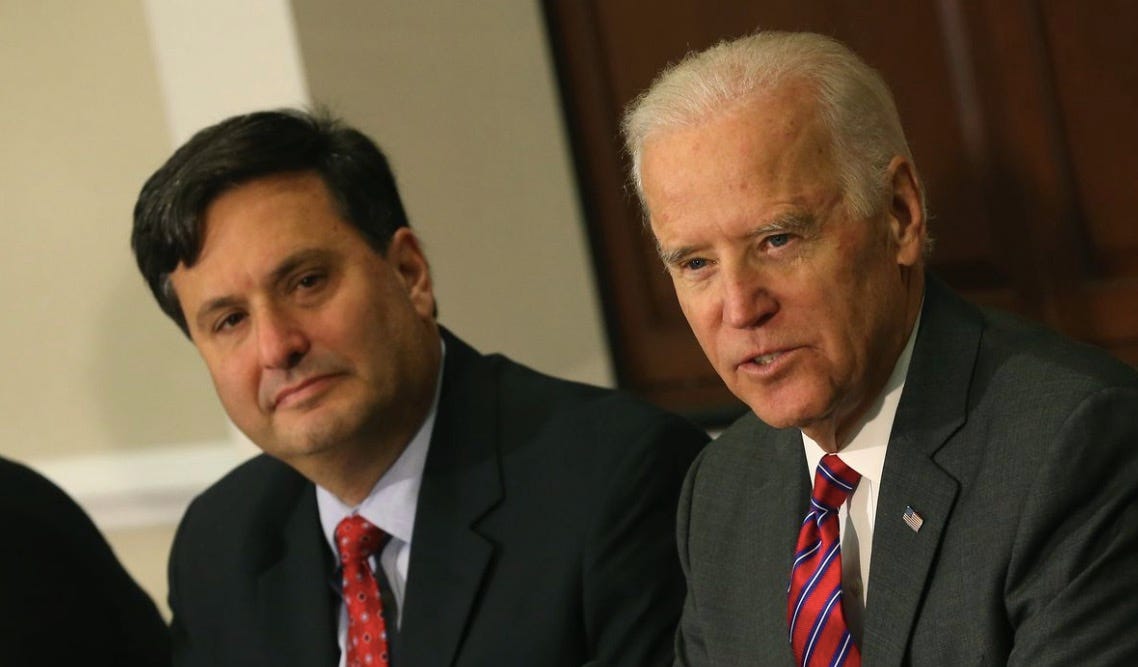Ron Klain to Step Down as Biden’s Chief of Staff, Was Ebola Czar in 2014, the Origin of Which Has Been Covered up
The day Klain became "Ebola czar" is that same day the Obama administration instituted a pause on funding the creation of potential pandemic pathogens. Klain oversaw Steve Case's health investments.
The New York Times reports that Ron Klain will be resigning as Biden’s chief of staff: “Mr. Klain has been a singularly important figure in Mr. Biden’s administration. Having worked for Mr. Biden off and on for more than three decades, admirers say that Mr. Klain channels the president as few others can. He is seen as so influential that Republicans derisively call him a virtual prime minister and Democrats blame him when they are disappointed in a decision.” However, “singularly” may be an exaggeration given that Biden put his longtime staffer Antony Blinken in as Secretary of State.
As previously reported, Klain was appointed “Ebola czar” on October 17, 2014. The same day the Obama White House instituted a “pause on funding for any new studies that include certain gain-of-function experiments involving influenza, SARS, and MERS viruses.”
That pause on funding however had numerous exceptions, including work done between by scientists including Zhengli-Li Shi of the Wuhan Institute of Virology and Ralph Baric of the University of North Carolina and published in 2015: “A SARS-like cluster of circulating bat coronaviruses shows potential for human emergence. The limited pause in funding was dropped in 2017 by the NIH.
As previously reported in my in-depth investigation into the 2014 Ebola outbreak with virologist Jonathan Latham, the official statement connected the pause to recent biosafety incidents at federal research facilities which had received a measure of media coverage. The New York Times reported on the move, noting that the pause: “made no mention of Ebola or any related filovirus.”
However, the timing of the announcement, and its occurrence alongside Klain’s elevation, were both highly is suggestive that the research pause and the Ebola outbreak were connected.
Moreover, on Aug. 7, 2014, in the midst of the outbreak, the U.S. government announced a similar decision. It cut funding to the U.S. lab consortium in West Africa, the Viral Hemorrhagic Fever Consortium (VHFC) based in Kenema, Sierra Leone, which many Africans had charged may have been responsible for the outbreak.
The VHFC is headed by Robert Garry of Tulane University. Its vice president is Kristian Andersen of Scripps Research.
Garry and Andersen were the two most vocal authors of “The proximal origin of SARS-CoV-2” in Nature Medicine — which claimed in March of 2020 that Covid could not have a lab origin. This article was (and still is) widely used to falsely dismiss the need for scrutiny as the public was attempting to understand the pandemic.
Klain is the second official connected to the Ebola outbreak to step down from the Biden administration. Celebrated geneticist Eric Lander, who, until he was apparently forced to resign in February, 2022, was President Biden’s chief science advisor. He remains the founding director of the prestigious Broad Institute of MIT and Harvard, which is a partner of the VHFC. Lander was further — along with Garry and Andersen — among the authors of “Genomic surveillance elucidates Ebola virus origin and transmission during the 2014 outbreak” which claimed that the 2014 outbreak was started in Guinea. However, my recent independent analysis, in collaboration with Jonathan Latham of the Bioscience Resource Center, found the phylogenetic analysis highly dubious.
The implication is that Lander, with Garry and Andersen, was part of a coverup to hide the role in the outbreak of the VHFC’s lab in Sierra Leone.
Further: If Klain suspected lab origin in of the 2014 outbreak, did he play any role in the coverup?
Open Secrets has noted Klain was “executive vice president at Revolution LLC, a venture capital firm” — where he has had two stints. He’s also been “president of Case Holdings, the company that manages AOL Chairman Steve Case's charitable and business interests. …Revolution [which was also founded by Case] invested in several healthcare companies while he was there, including BrainScope, Everyday Health and Extend Health.”
BrainScope “uses AI and machine learning technology to identify objective biomarkers of structural and functional brain injury in patients with suspected mild traumatic brain injury (mTBI).”
Everyday Health creates “trustworthy content based on up-to-date, evidence-based health and medical information and real world patient and clinician experience to help inform you how to take control of your health.”
Extend Health has since changed its name to OneExchange and again to Via Benefits. It describes itself as “a Trusted Advisor for Medicare Coverage”.
It is mentioned in the Bloomberg article “Private exchanges are sending us in dangerous directions” which is posted on the website of Physicians for a National Health Program.




